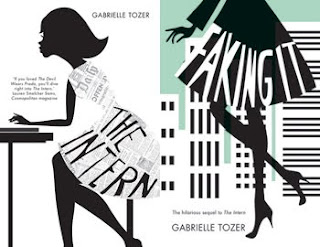As a genre, young adult (YA) is often
viewed as being somehow a ‘lesser’ genre than adult fiction. As such, it has certain rules and
expectations that adult fiction doesn’t have. One of these is that a YA novel
should always have a Happily Ever After (HEA) ending. This is probably due to some
misguided belief about what teenagers/young adult readers are able to cope
with.
In the session Happy Ending at the Bendigo Writers Festival,
young adult authors Gabrielle Tozer and Ellie Marney discussed this expectation
and their own thoughts on the importance of a HEA ending. Both Tozer and Marney
had the opinion that the ending of a YA novel should depend on the story rather
than fitting in with what is expected. They both said that if the ending doesn’t match the
story, it's going to be jarring and readers will be able to tell that this wasn't the proper ending.
 |
| Photo credit:http://www.happyindulgencebooks.com/2015/11/11/double-reviews-the-intern-faking-it-by-gabrielle-tozer/ |
Tozer, whose most recent book Faking It focuses on Josie Browning
dealing with the pressures of her new job, likes to decide her
ending based on what the characters ‘earn’, or basically on what they have gone
through in the novel. If they have faced struggles she feels like they need to
have a kind of reward, thus a HEA. Marney, author of the YA crime series Every which focuses on the crime solving adventures of Rachel Watts and James Mycroft, also believed this, and added that she thinks that HEA can sometimes be off putting for teens
because it can come across as overly optimistic. Marney thinks that teenagers
in particular don’t need HEA endings because they are going through a
time of great change and can be full of angst and worry. However, she does
believe they need some hope throughout and at the end of the novel to offset
any darkness in the book or in real life. Due to this Marney appeared to argue
that if a HEA doesn’t suit the book, the ending should at least include a
little bit of hope for the characters.
 |
| Photo credit:https://rowreads.blogspot.com.au/2015/09/game-review-life-is-strange-episode-4.html |
Personally, I love reading HEA, but I think
that’s also mostly because its what I’ve come to expect from books. I read a
lot of series, and even if one book ends on a cliffhanger, there is a part of
me that always expects the series to end happily in some way shape or form, which I suppose then takes away from the cliffhanger.
I think a great example of this dichotomy
between a HEA ending being wanted versus what is good for the story is The Iron Fey series by Julie Kagawa.
This is a quartet series that was originally meant to be a trilogy. At the end
of The Iron Knight (the last book in
the series) there is an extra little interview in which Kagawa admits that she
is a fan of the Ultimate Noble Sacrifice ending and (sorry for any spoilers)
this was the end of the character arc she had in mind for the protagonist
Meghan. However, Kagawa’s editor is a fan of the HEA and convinced Kagawa to
write the extra book, from the perspective of the male protagonist Ash, to
finish on a happier note for some of the characters. I loved this ending, but
plot wise I think it would have been perhaps a stronger ending if Kagawa had just left it
at The Iron Queen.
 |
| Photo credit: http://strangechemistrybooks.com/2012/07/19/introducing-the-iron-fey-series/ |
Basically, I think what Tozer and Marney
said about the ending needing to match the story is the smart thing to do. Although this may change and it may end up having a HEA ending, this type of ending
should never be forced just because it is a YA novel and that is what is expected.
No comments:
Post a Comment